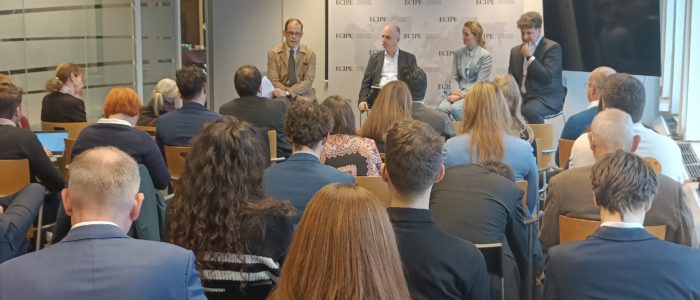Published
Event Summary: The Crucial Role of Cloud and AI Leadership to Drive Competitiveness in Europe
By: Fredrik Erixon Guifré Margarit i Contel
Subjects: Digital Economy European Union Services

The panel discussion “The Crucial Role of Cloud and AI Leadership to Drive Competitiveness in Europe,” hosted in our office, provided a platform for experts to examine the vital role of cloud computing and AI in strengthening Europe’s economic competitiveness. The event, moderated by ECIPE Director Fredrik Erixon, brought together Manuel Mateo Goyet, Acting Head of Unit, Cloud and Software at DG CNECT (European Commission), Katinka Clausdatter Worsøe, Counsellor for Digitalisation at Denmark Permanent Representation to the EU, and Antonio Freitas, EMEA Head of Sovereign Cloud & Public Sector COE at Oracle. Their perspectives illuminated the challenges and opportunities in ensuring Europe’s digital leadership while balancing sovereignty, efficiency, and innovation.
Manuel Mateo Goyet outlined Europe’s current position, acknowledging gaps in cloud capacity and AI infrastructure. He highlighted the EU’s struggle to match global competitors, stating:
“Europe has not trained any of the large AI models […] We are about a third of the US capacity in pure data centres.”
This disparity underscores a critical need for Europe to develop sovereign capabilities while fostering partnerships that align with its values.
Manuel also referenced the Draghi Report, which emphasises autonomy in sovereign cloud applications. However, defining sovereignty remains complex, with terms like “highly critical” and “sensitive” varying across sectors and nations. He stressed the importance of reducing bureaucratic hurdles, such as lengthy permitting processes, which impede progress in building necessary infrastructure.
Katinka Clausdatter Worsøe shared Denmark’s leadership in digitalisation, noting its high adoption rates of cloud and AI. Yet, she warned against overregulation:
“We need to be very proportionate […] If we take too broad an approach, we might actually end up hurting ourselves and limiting our competitiveness.”
She championed harmonised European definitions of “sensitive” and “critical” data to create a unified market for secure and green cloud services. Denmark’s recent AI strategy demonstrates its commitment to supporting public sector adoption of AI while addressing procurement challenges and compliance with GDPR.
Antonio Freitas, representing Oracle, provided a pragmatic view from the industry’s frontlines. He stressed that modern cloud services are not just about infrastructure but about enabling innovation at unprecedented speeds:
“Cloud is all about your ability to innovate at speed and at scale […] Millions of lines of code enable businesses to solve problems with a few clicks.”
However, he identified key barriers to adoption, including limited technical skills, fragmented regulations, and procurement inefficiencies. For example, European governments often face delays due to unclear sovereignty definitions, inconsistent cybersecurity standards, and a lack of common frameworks like the EU Cloud Security Certification Scheme (EUCS).
Antonio also proposed solutions, such as standardised “landing zones” to provide a secure baseline for cloud adoption, echoing successful practices from other regions like the United States.
The panellists agreed on the need for Europe to embrace cloud and AI while addressing critical concerns around sovereignty, security, and sustainability. They urged policymakers to act decisively in harmonising regulations and fostering innovation.
This discussion reinforced that leadership in cloud and AI is not merely a technological ambition but a strategic necessity for Europe to secure its place in the global digital economy. By addressing the identified challenges and leveraging collaborative efforts, Europe has the potential to transform its digital landscape and drive competitiveness in the decades to come.